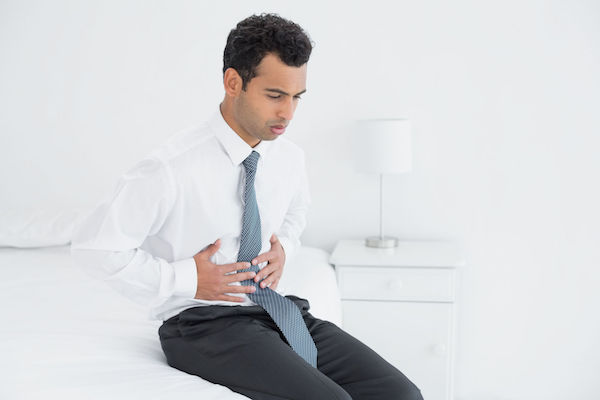Gastritis encompasses a group of conditions with one thing in common, that is, inflammation of the stomach lining. It can be classified as either chronic or acute, depending on whether it develops slowly over time (chronic), or occurs suddenly (acute).

Common gastritis causes include:
- Infection by the bacterium Helicobacter pylori (H. pylori), which can lead to peptic ulcers and even stomach cancer in some cases
- The over-use of certain medications, particularly aspirin and non-steroidal anti-inflammatories (NSAIDs)
- Alcohol and drug abuse
- Autoimmune conditions
- Chronic vomiting
- Stress
- Other infections caused by bacteria and viruses can also contribute towards its development
What are its symptoms?
While in some cases it can be asymptomatic, common gastritis symptoms include:
- Stomach pain, usually in the upper, central abdomen, which may be continuous or intermittent and can be described as burning, aching, gnawing or dull
- Nausea and vomiting. In cases where gastritis is as a result of stomach ulcers, there may be blood in the vomit
- Abdominal bloating
- Loss of appetite
- Burping
- Feelings of fullness
- Black stools is another sign of bleeding from the stomach
How is it diagnosed?
A medical history including information about any other conditions, medication and drug and/or alcohol use, and a physical examination usually establish a gastritis diagnosis, but additional tests may be carried out in order to ascertain what’s behind the gastritis.
Endoscopy is a simple procedure whereby a flexible tube with a tiny camera is passed down the throat into the stomach, allowing the doctor a close-up look at the patient’s stomach lining. A biopsy may be performed so that a sample can be analysed in a laboratory, but a simple blood, breath or stool test can also pick up the presence of H. pylori.
What are your treatment options?
Gastritis treatment depends on the underlying cause of the inflammation. In cases of H. pylori infection, antibiotics are prescribed to kill the bacterium. These must be used exactly as directed.
Medications, such as antacids to neutralise stomach acid or proton pump inhibitors, which reduce the amount of acid produced in the stomach, can promote healing and recovery after a bout of gastritis.
Your healthcare provider will be able to recommend the correct medication based on the severity of the gastritis. In cases where gastritis is caused by alcohol or drug use, these substances should be avoided.
Can it be prevented?
Studies don’t indicate that any specific foods lead to the development of gastritis, so people are advised simply to avoid foodstuffs they find cause discomfort.
For those regularly using non-steroidal anti-inflammatories (NSAIDs), a major risk factor for developing the condition, gastritis prevention might mean switching to a different type of pain medication or adding a cytoprotective medicine to protect the lining of the stomach. Discuss this with your healthcare provider.
The mechanism of H. pylori transmission is not yet understood, making it hard to put protective measures in place but good hygiene is a start to prevent the transmission of bacteria.
IMAGE CREDIT: 123rf.com
